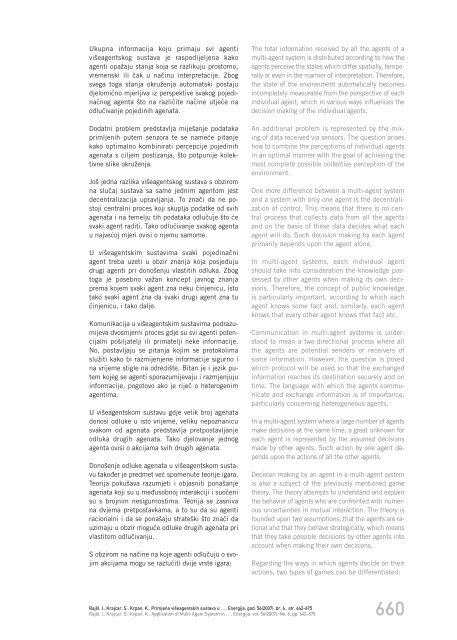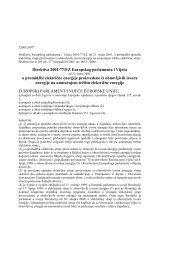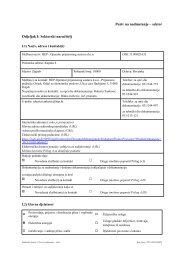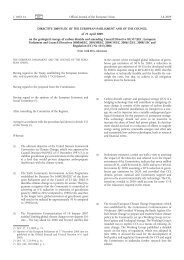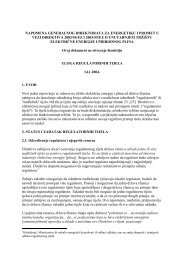Untitled - HEP Grupa
Untitled - HEP Grupa
Untitled - HEP Grupa
- No tags were found...
You also want an ePaper? Increase the reach of your titles
YUMPU automatically turns print PDFs into web optimized ePapers that Google loves.
Ukupna informacija koju primaju svi agentiviπeagentskog sustava je raspodijeljena kakoagenti opaæaju stanja koja se razlikuju prostorno,vremenski ili Ëak u naËinu interpretacije. Zbogsvega toga stanja okruæenja automatski postajudjelomiËno mjerljiva iz perspektive svakog pojedinaËnogagenta πto na razliËite naËine utjeËe naodluËivanje pojedinih agenata.Dodatni problem predstavlja mijeπanje podatakaprimljenih putem senzora te se nameÊe pitanjekako optimalno kombinirati percepcije pojedinihagenata s ciljem postizanja, πto potpunije kolektivneslike okruæenja.Joπ jedna razlika viπeagentskog sustava s obziromna sluËaj sustava sa samo jednim agentom jestdecentralizacija upravljanja. To znaËi da ne postojicentralni proces koji skuplja podatke od svihagenata i na temelju tih podataka odluËuje πto Êesvaki agent raditi. Tako odluËivanje svakog agentau najveÊoj mjeri ovisi o njemu samome.U viπeagentskim sustavima svaki pojedinaËniagent treba uzeti u obzir znanja koja posjedujudrugi agenti pri donoπenju vlastitih odluka. Zbogtoga je posebno vaæan koncept javnog znanjaprema kojem svaki agent zna neku Ëinjenicu, istotako svaki agent zna da svaki drugi agent zna tuËinjenicu, i tako dalje.Komunikacija u viπeagentskim sustavima podrazumijevadvosmjerni proces gdje su svi agenti potencijalnipoπiljatelji ili primatelji neke informacije.No, postavljaju se pitanja kojim se protokolimasluæiti kako bi razmijenjene informacije sigurno ina vrijeme stigle na odrediπte. Bitan je i jezik putemkojeg se agenti sporazumijevaju i razmjenjujuinformacije, pogotovo ako je rijeË o heterogenimagentima.U viπeagentskom sustavu gdje velik broj agenatadonosi odluke u isto vrijeme, veliku nepoznanicusvakom od agenata predstavlja pretpostavljanjeodluka drugih agenata. Tako djelovanje jednogagenta ovisi o akcijama svih drugih agenata.Donoπenje odluke agenata u viπeagentskom sustavutakoappleer je predmet veÊ spomenute teorije igara.Teorija pokuπava razumjeti i objasniti ponaπanjeagenata koji su u meappleusobnoj interakciji i suoËenisu s brojnim nesigurnostima. Teorija se zasnivana dvjema pretpostavkama, a to su da su agentiracionalni i da se ponaπaju strateπki πto znaËi dauzimaju u obzir moguÊe odluke drugih agenata privlastitom odluËivanju.S obzirom na naËine na koje agenti odluËuju o svojimakcijama mogu se razluËiti dvije vrste igara:The total information received by all the agents of amulti-agent system is distributed according to how theagents perceive the states which differ spatially, temporallyor even in the manner of interpretation. Therefore,the state of the environment automatically becomesincompletely measurable from the perspective of eachindividual agent, which in various ways influences thedecision making of the individual agents.An additional problem is represented by the mixingof data received via sensors. The question ariseshow to combine the perceptions of individual agentsin an optimal manner with the goal of achieving themost complete possible collective perception of theenvironment.One more difference between a multi-agent systemand a system with only one agent is the decentralizationof control. This means that there is no centralprocess that collects data from all the agentsand on the basis of these data decides what eachagent will do. Such decision making by each agentprimarily depends upon the agent alone.In multi-agent systems, each individual agentshould take into consideration the knowledge possessedby other agents when making its own decisions.Therefore, the concept of public knowledgeis particularly important, according to which eachagent knows some fact and, similarly, each agentknows that every other agent knows that fact etc.Communication in multi-agent systems is understoodto mean a two-directional process where allthe agents are potential senders or receivers ofsome information. However, the question is posedwhich protocol will be used so that the exchangedinformation reaches its destination securely and ontime. The language with which the agents communicateand exchange information is of importance,particularly concerning heterogeneous agents.In a multi-agent system where a large number of agentsmake decisions at the same time, a great unknown foreach agent is represented by the assumed decisionsmade by other agents. Such action by one agent dependsupon the actions of all the other agents.Decision making by an agent in a multi-agent systemis also a subject of the previously mentioned gametheory. The theory attempts to understand and explainthe behavior of agents who are confronted with numerousuncertainties in mutual interaction. The theory isfounded upon two assumptions, that the agents are rationaland that they behave strategically, which meansthat they take possible decisions by other agents intoaccount when making their own decisions.Regarding the ways in which agents decide on theiractions, two types of games can be differentiated:Rajšl, I., Krajcar, S., Krpan, K., Primjena višeagentskih sustava u …, Energija, god. 56(2007), br. 6., str. 642-675Rajšl, I., Krajcar, S., Krpan, K., Application of Multi-Agent System in …, Energija, vol. 56(2007), No. 6, pp. 642-675660


